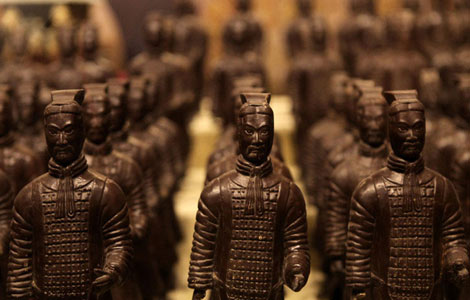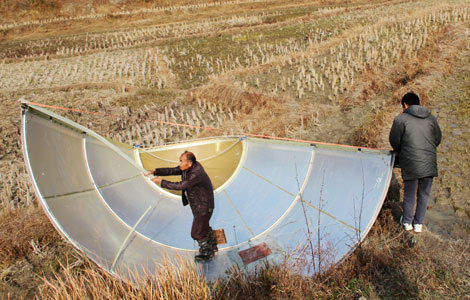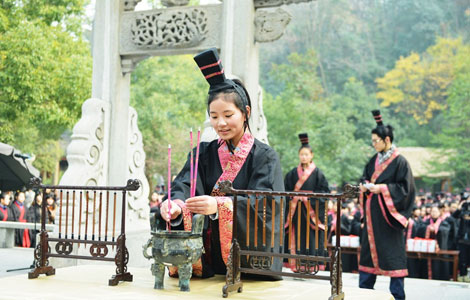

For many Chinese, Colombo is a great place to shop for jewelry and tea, but for Li Yong, the Sri Lankan capital is the location of the latest in his chain of Chinese bookstores.
Li's company, Kunming Xinzhi Group, is China's largest private book retailer, with 58 outlets around the country. It opened its fifth overseas bookstore in late November in Sri Lanka. The 450-square-meter shop is the first in South Asia, but others have opened in Phnom Penh, Vientiane, Kuala Lumpur and Mandalay in Myanmar during the past two years.
"We have a medium-term plan that by 2015 we will have 10 bookstores in Southeast and South Asia. Our long-term plan is to have 20 around the world by 2020," said Li, the founder and president of Kunming Xinzhi, who began conducting market research into Southeast Asia in the mid-1990s, finally opening the first overseas store in Phnom Penh in Cambodia in November 2011. He found that the demand for knowledge about China and for Chinese language learning aids is growing rapidly in the region, so the company decided to focus on Asian cities with large populations of ethnic Chinese and Chinese entrepreneurs.
"We are also considering Indonesia, Vietnam, Thailand, Bangladesh and Nepal," Li said. "Our sixth store will be on the way when we can rent a proper place in any of those countries."
Li's confidence about future expansion is built on the enthusiastic reactions of readers in the five countries where the stores have already launched. At the opening ceremony, and during an earlier 10-day trial run, the Colombo store sold a wealth of Chinese dictionaries, ancient literature, modern novels and language textbooks.
Xinzhi's vice-president, Yao Shusheng, who is in charge of overseas operations, said many students from the local Confucius Institute, a language school backed by the Chinese government, have flocked to the store.
"Our target customers are Chinese people who work in those countries, people of Chinese descent who want to know more about the culture, local people who are learning Chinese, and scholars and officials who are interested in China," he said.
"We sell the 'big culture' concept in our stores. Not just Chinese books, but also audiovisual products, sports goods, gifts, even furniture and accessories," he said.
There are future plans for Chinese schools, galleries and cultural centers under the company's brand. "We need a multi-driven business model to support our overseas operations. After all, the purchasing power for Chinese books in those countries can't be as high as in the domestic market," he said.
Learning for the future
Except for the store manager and one assistant sent from China, all employees are local hires.
"Most of them are of Chinese descent and have some founding in the language," said Li. The company trains them and, over time, many of them have learned to speak and even write in Chinese. It will be beneficial for their future jobs."
Daumnimon, 33, works in the Phnom Penh store. A friend introduced the former factory worker to the language two years ago.
"I started learning Chinese in 1997, but my language skills have really improved since I became a bookseller," said the ethnic Chinese man, who added that Chinese textbooks are the most popular items in the store.
Dhananjaya Sutanto, a Jakarta-born ethnic Chinese who has spent the last few years working in China, felt the demand for Chinese books may be limited, even though many people are curious about the new Chinese bookstore in the neighborhood.
"In Jakarta, we have many small Chinese bookstores. The problem is that books here are too expensive," he said. "For example, one Xinhua Dictionary (the standard dictionary of modern Chinese) can sell for about 200 yuan ($33), while in China it costs around 20-something."
"I'd rather buy one from China and carry it back home," he said. "Plus, there are some books related to business practice that are always hard to find outside China."
Sutanto believes that the next generation of ethnic Chinese will have better language skills, but he pointed out that they are also very comfortable with Western culture, including movies, music and novels.
"I don't know how much they would like to go to a Chinese bookstore at the weekend with friends and read Chinese books," he said.
However, Li is sanguine about the development of the language abroad.
"On Aug 15 when I visited our Phnom Penh store, two Singaporeans asked if we were selling Zhu Rongji's Shanghai Speeches," said Yao. "I was amazed. The former premier's new book had only been published in China three days earlier. I told myself: 'People are watching China closely from every corner of the planet'."
benyue@chinadailyhk.com







